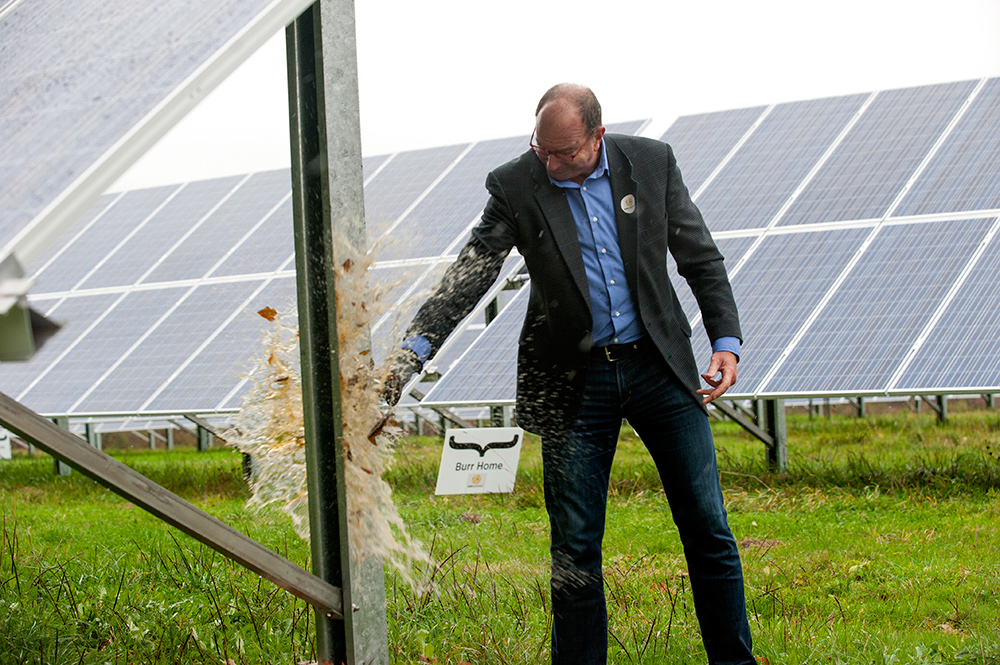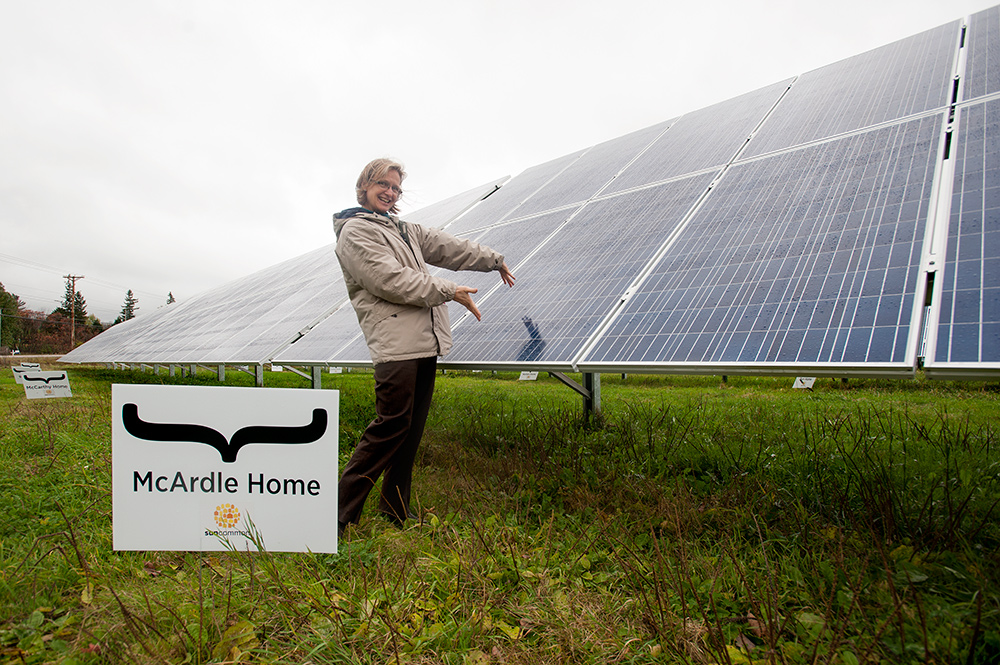SunCommon launches first Community Solar Array!
WALTHAM, Vermont – SunCommon, Vermont’s largest residential solar company, announced a new solar solution to serve thousands of Vermonters: the Community Solar Array (CSA). SunCommon commissioned its first Community Solar Array in Waltham today by christening the array with a bottle of Middlebury’s Drop-In Brewery ‘Sunshine and Hoppiness’ beer. This first CSA serves 30 Vermont homes; over the next two years, SunCommon will be building Community Solar Arrays around the state that will serve 2,000 Vermonters.
While solar is perfect for many Vermont households, some homes are not great candidates because they do not face south or have trees that block the sunshine. SunCommon’s new Community Solar program allows all Vermonters to take part in the state’s official renewable energy goals. “Creative projects like this that offer more Vermonters the opportunity to participate in net metering are exactly why the Shumlin Administration worked so hard with legislators to expand the net metering program last legislative session,” said Darren Springer, Public Service Department Deputy Commissioner. “Vermont is number one in solar jobs per capita and we have more than quadrupled the amount of solar on our grid since 2011. It is critical that we continue this progress as we move toward the goal of 90 percent renewable energy by 2050.”
Landowners with an acre of available land can opt to host one of SunCommon’s Community Solar Arrays. “Having lived in my community for 37 years, I have become more and more interested in the connections and closeness the word ‘community’ evokes,” says Evergreen Erb, a SunCommon CSA host. “Being part of a Community Solar Array is a way of celebrating and giving back to our home and state communities.”
CSA memberships are available first to folks in that community so that the benefits of a Community Solar Array are enjoyed by local homeowners near that CSA. “I couldn’t put solar on my own roof, so I feel good about helping this effort right here in Addison County,” says Wendy McArdle, a SunCommon CSA member. “The CSA was the tipping point for me. It was so easy and convenient. This is a sign of a brighter energy future for our state. We’re moving toward energy independence by building a better, and more sustainable, energy system.”
As Vermont sees an increase in solar arrays, SunCommon wants to affirm its role in working with Vermont towns. “Because these Community Solar Arrays must respect their communities and meet their needs, SunCommon created a Good Neighbor Agreement,” says Duane Peterson, co-president and co-founder of SunCommon. “This agreement follows our core principles and makes clear our commitments to the communities we seek to serve. We take into account public benefit and aim to engage with our communities early in the process.” SunCommon has learned from its first array project and pledges to present proposals to Town Selectboards, Energy Committees, civic groups and the media – soliciting local reactions and ideas. “This system standing behind us is the birth of an innovative new program in the effort to build an independent energy future for our Vermont. We’re all in this together and our goal is to make it easy and affordable for regular Vermonters to participate in repowering our beloved state.”
What are RECs?
Renewable Energy Certificates document the environmental attributes produced by renewable energy sources, and can be sold to contribute funds needed to build a solar project like a CSA. Currently, Vermont does not have a renewable portfolio standard that provides a market to buy or sell RECs within Vermont. So, the RECs may be sold to utilities in neighboring states. Where SunCommon sells RECs associated with a CSA, the buyer of the Renewable Energy Credits may claim the environmental attributes. Given the way electrons flow, the power from the solar array typically flows to neighbors of the array. A CSA Member does not receive solar energy, but receives solar credits in the form of cash on her/his utility bill.
RECs are one of the financial attributes that are bundled together to make it possible to offer CSA membership at a low monthly payment and guaranteed savings. We expect Vermont to adopt our own renewable portfolio standard in 2017, after which the RECs associated with the electricity generated by CSAs will support Vermont’s clean energy goals.
Want to learn more about how our Community Solar projects come together? Happy to help.
That’s why we’ve put together this Q+A.

